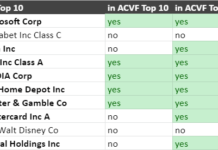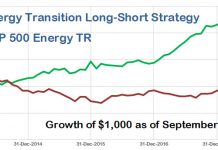UPDATE 2/23/09: Here are in depth looks at available Clean Energy ETFs and Clean Energy Mutual Funds.
In my articles about Clean Energy Mutual Funds and Exchange Traded Funds (ETFs), I usually say:
My recent update on the not-so-bad-as-might-have-been-expected performance of my ten speculative picks for 2008 might be an example of this. Or it might have been luck. But I’m not the only one trying to beat the market in alternative energy, actively managed mutual funds are also trying. This is the only rational justification for paying their high fees. If, after fees, an actively managed mutual fund has a higher return than a passively managed index fund or ETF, then it is worth paying the fee. If the gains from active management are not enough to pay for the fees, then they are not worth paying.
| Fund Name & Ticker | Active? | Global? | 2008 return* | 2007 return |
| Calvert Global Alternative Energy Fund (CGAEX) | Yes | Yes | -59% | N/A |
| Firsthand Alternative Energy (ALTEX) | Yes | Yes | -51% | N/A |
| Guinness Atkinson Alternative Energy Fund (GAAEX) | Yes | Yes | -68% | 41% |
| First Trust NASDAQ Clean Edge US Liquid (QCLN) | No | No | -67% | N/A |
| New Alternatives FD Inc (NALFX)** | Yes | Yes | -46% | 32% |
| PowerShares Clean Energy (PBW) | No | No | -70% | 58% |
| PowerShares Global Clean Energy Portfolio (PBD) | No | Yes | -63% | N/A |
| Van Eck Global Alternative Energy Fund (GEX) | No | Yes | -64% | N/A |
| Winslow Green Growth Fund (WGGFX) | Yes | Yes | -63% | +23% |
* through Dec 27, 2008. ** The New Alternatives Fund charges a front-end load, as well as an annual management fee, so actual investor returns will be lower than those shown.
Drawing Comparisons
Because the First Trust NASDAQ Clean Edge and Powershares Clean Energy ETFs (shown in white above) only contain US-traded stocks, I have eliminated them from the comparison. The differences in performance are more likely to be dominated by the different investment universes than the difference between active and passive management. Most well-established alternative energy players are foreign, so domestic-only funds are likely to contain a higher proportion of more volatile stocks. This means that domestic funds will tend to outperform in good years, and under-perform in bad. This prediction is borne out by the performance figures above: QCLN and PBW underperformed nearly all the global funds in 2008, and PBW outperformed the three global funds which were around for all of 2007.
Among the global funds, the actively managed funds (shown in green) had performances ranging from -68% to -46% in 2007, with an mean of -57.4% and a standard deviation of 8.9%. The passively managed funds (blue) had performances of -63% and -64%, both of which were within a single standard deviation of the mean performance of the actively managed funds. Statistically, this means we can’t draw any conclusion about the effect of active management on the returns of these funds.
If the returns for my ten speculative picks (-55% for 2008) are included in the active management, the active management mean increases to -57.0%, and the standard deviation drops to 8.0%, but the comparison remains inconclusive. (Statistics geek note: Technically, I should be using a two-sample t-test to compare the two populations, but that test will always be inconclusive if the informal z-test I went through above is inconclusive.)
Finally, if we include the two passively managed domestic ETFs, the mean of the passive sample becomes -66%, and the standard deviation 3.1%. This also fails the two-sample t-test for statistical significance at the 95% confidence level. Although it comes close to statistical significance, the inclusion of domestic-only funds in the passive sample would have made even a statistically significant result suspect.
Conclusions
With this data, there’s no statistical reason
to believe that the actively managed funds are any better (or worse) than the passive funds. Since the management fees of the actively managed funds above are typically two to three times as high as the passively managed funds, the evidence still points to the passively managed funds as the best pick.
However, if you are willing to take the time to manage your own money actively, and do not consider the time it takes as a cost, the returns above show that it’s not difficult to beat most of the available funds just by reading this blog. (As with actively managed funds, we don’t know if my results were due to luck or skill.)
On New Year’s Eve, I will publish an article with ten clean energy picks for 2009 (the link will be broken until then.)
Next year, we’ll have at least twice as much data.
Tom Konrad, Ph.D.
DISCLOSURE: GAAEX is an advertiser on the author’s website, AltEnergyStocks.com.
DISCLAIMER: The information and trades provided here are for informational purposes only and are not a solicitation to buy or sell any of these securities. Investing involves substantial risk and you should evaluate your own risk levels before you make any investment. Past results are not an indication of future performance. Please take the time to read the full disclaimer here.









Currently there are not a lot of choices for clean energy mutual funds. With the added environmental awareness that we’re seeing do you expect more funds will be offered in the near future?
The problem is not so much the lack of funds, but the high fees they charge.
I currently follow five clean energy mutual funds, (there were six until one folded recently
I also follow eleven clean energy ETFs, which are a more efficienct way to invest in the sector.
Do I think there will be more soon? Number of funds usually follows fund inflows, and most clean energy funds have been holding on to or even gaining assets even during the financial crisis, so I think if any secotr is likely to add funds, it will be clean energy.